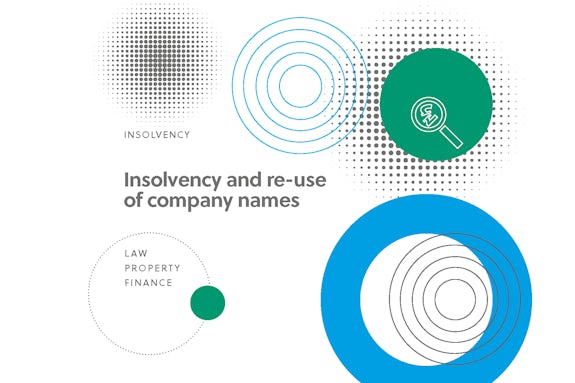The corporate insolvency regime contains a prohibition on the re-use of a company’s name following an insolvent liquidation. The prohibition is in place to deter “phoenixing”: where the debt laden entity is ditched but business carries on under a new entity without the debt. Directors of companies facing insolvent liquidation are well advised to take advice on the re-use of company names. Breaching the prohibition can result in both criminal and civil liability, in other words directors risk jail time if they breach these provisions even inadvertently.
What’s prohibited and for how long?
The prohibition on the re-use of a company’s name is restricted to situations where the company ends up in an insolvent liquidation. Solvent liquidations are unaffected. The prohibition applies to individuals who are or have been in the 12 months prior to the liquidation directors or shadow directors of the insolvent company. Affected directors are prohibited for a period of 5 years from being involved in a business using a prohibited name, so the same name or something so similar as to suggest an association with the liquidated company. The prohibition on “the carrying on of a business” using a prohibited name is rather wide. It includes being a director of a registered company with a prohibited name, but also the taking part in the management of such a company, and carrying on a business with a prohibited name where that business is not a registered company. For example, a director could not set up as a sole trader using a prohibited name.
The prohibited name is not limited to the exact name the company was registered with at Companies House. It also includes part of the company name, trading names and acronyms, anything that might “suggest an association” with the business of the liquidated company.
Are there any exceptions?
Clearly, there will be situations where being able to use a company name after an insolvent liquidation will be important. Examples may include groups of companies with similar names and shared management. There are three statutory exceptions to the blanket prohibition on the re-use of company names. If a director’s situation does not fall within one of the three exceptions, there is also scope to apply to the court for permission to re-use a company name.
The first exception permits re-use of a company name where the whole or substantially the whole of the business of the insolvent company is sold to the new entity and notice of the sale and re-use of the company name is given by the director to all the creditors of the insolvent company.
The second exception is much more limited. It provides for up to six weeks interim permission to the director, provided that the director applies to the court for permission to re-use the company name within seven days of the insolvent company going into liquidation. This second exception is intended to provide some temporary protection to a director pending the presentation and determination of their court application.
The third exception is most useful for company group arrangements. It permits re-use of a company name where a company has already been known by that name for at least 12 months before the insolvent company went into liquidation and has not been dormant during the 12 months prior to the liquidation.
At a time when many companies will be struggling with debt incurred during the pandemic but the underlying business has the possibility of succeeding, directors must get good advice early on what their options for restructuring their business are and any consequences that this may have for them if continuing to use the prior business name.
If you would like further information on the topic discussed in this article, please contact a member of the Insolvency Team.
Steven Jansch by email: sjansch@gilsongray.co.uk or by phone: 0131 516 5361 / 07841 920 100.
Eilidh MacEwan by email: emacewan@gilsongray.co.uk or by phone: 0131 285 1809 / 07376 192 463.
The information and opinions contained in this blog are for information only. They are not intended to constitute advice and should not be relied upon or considered as a replacement for advice. Before acting on any of the information contained in this blog, please seek specific advice from Gilson Gray.







